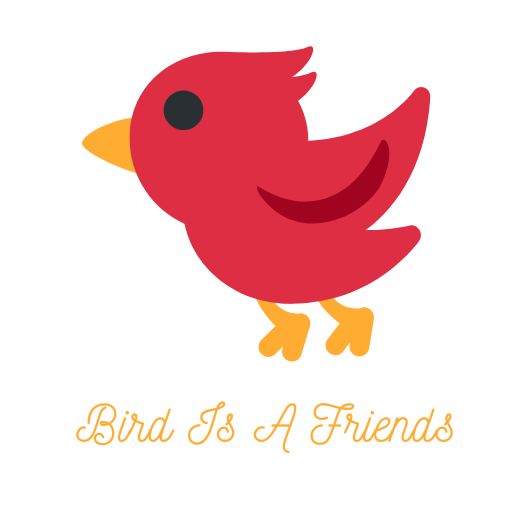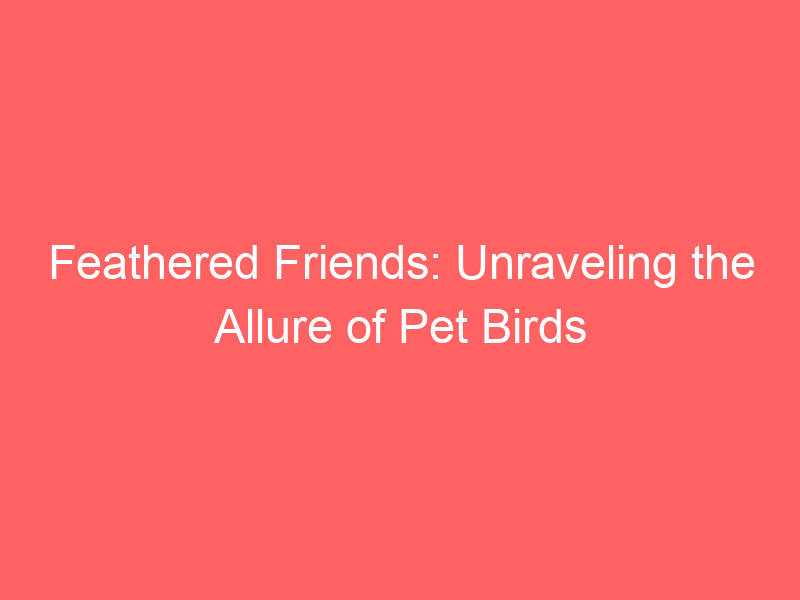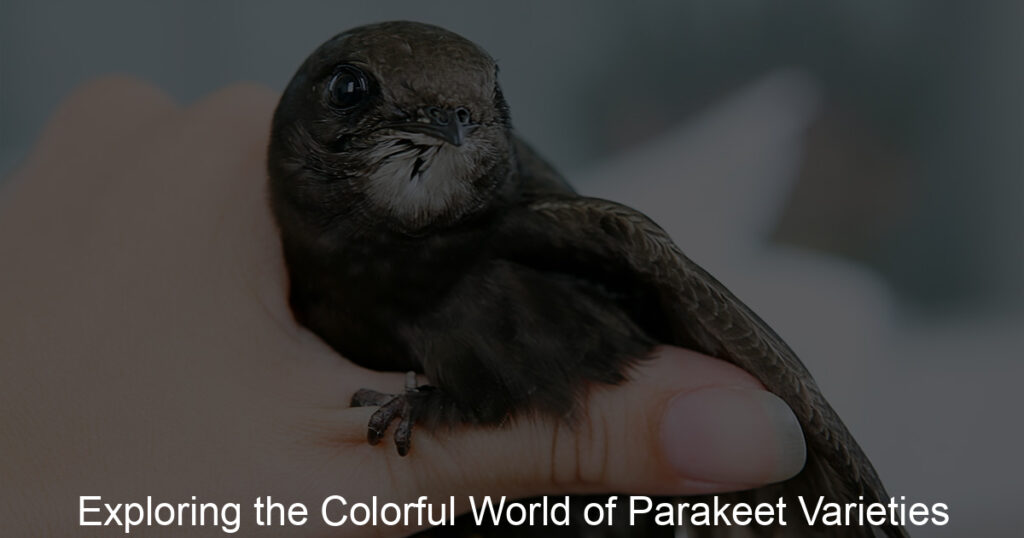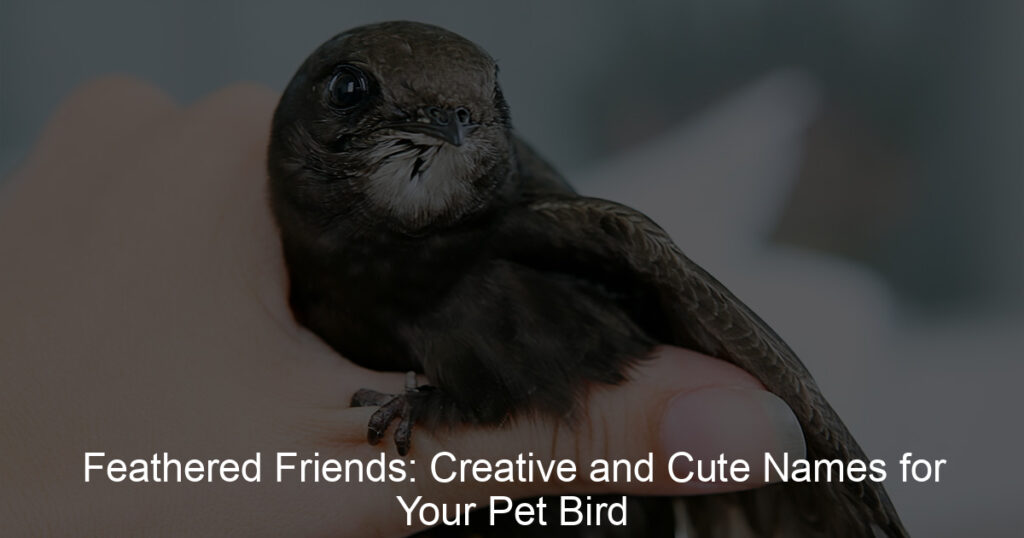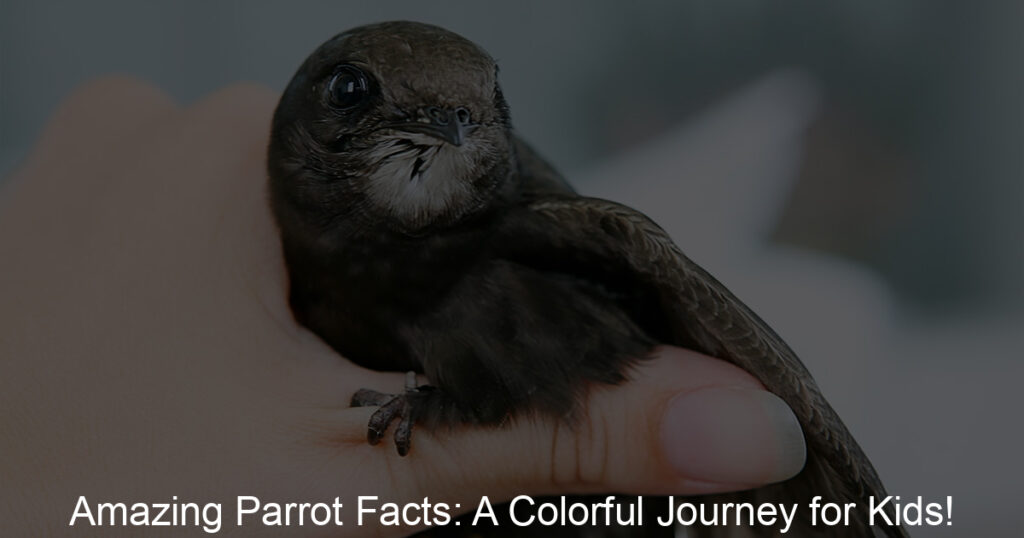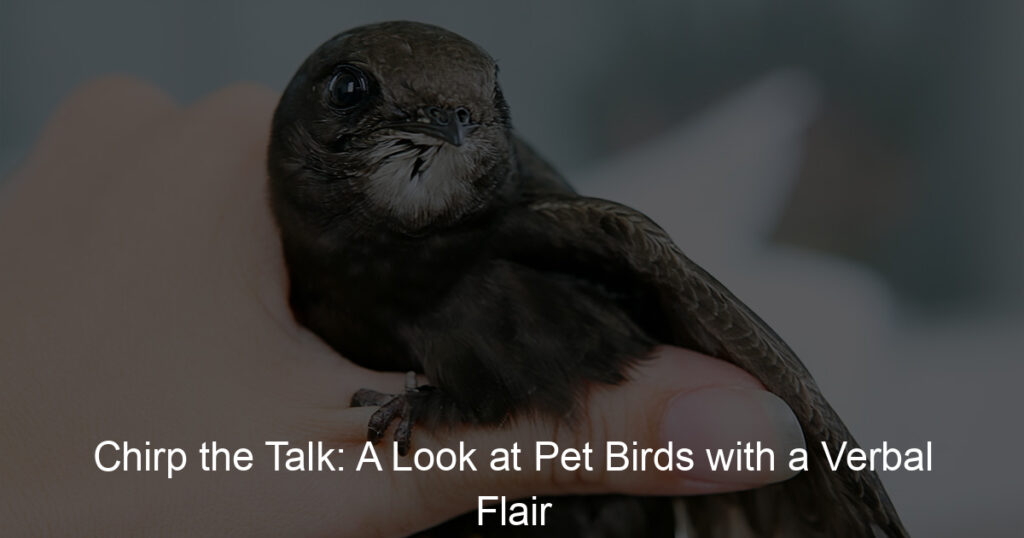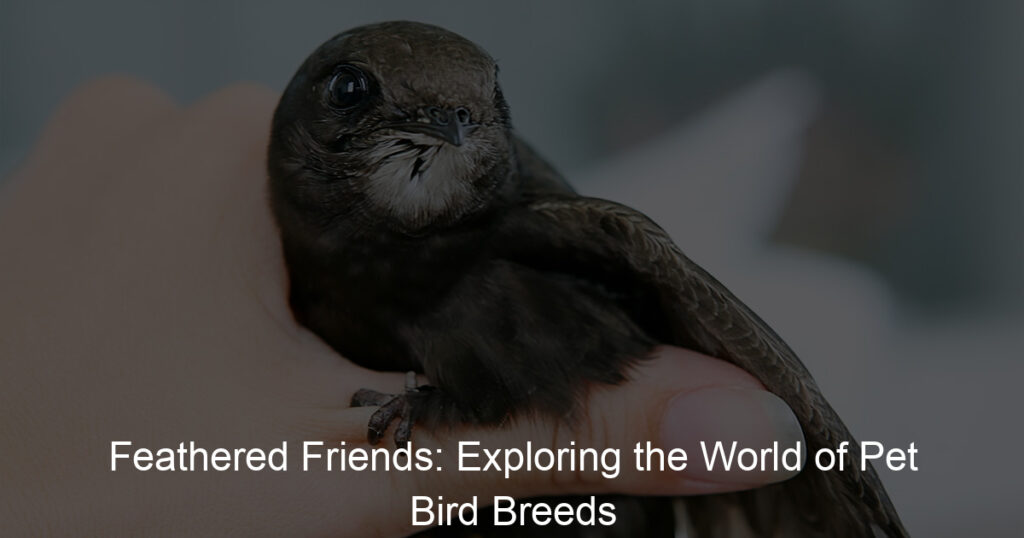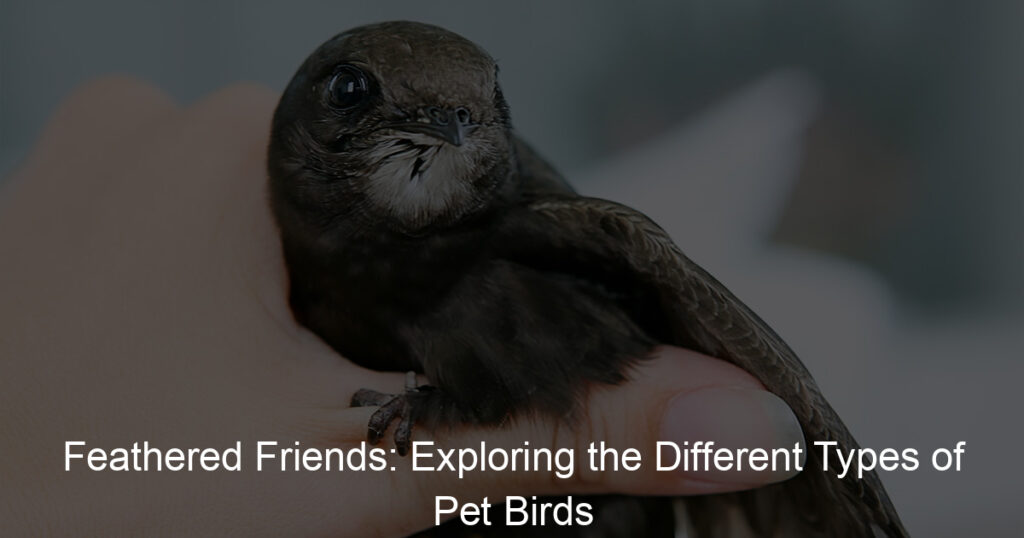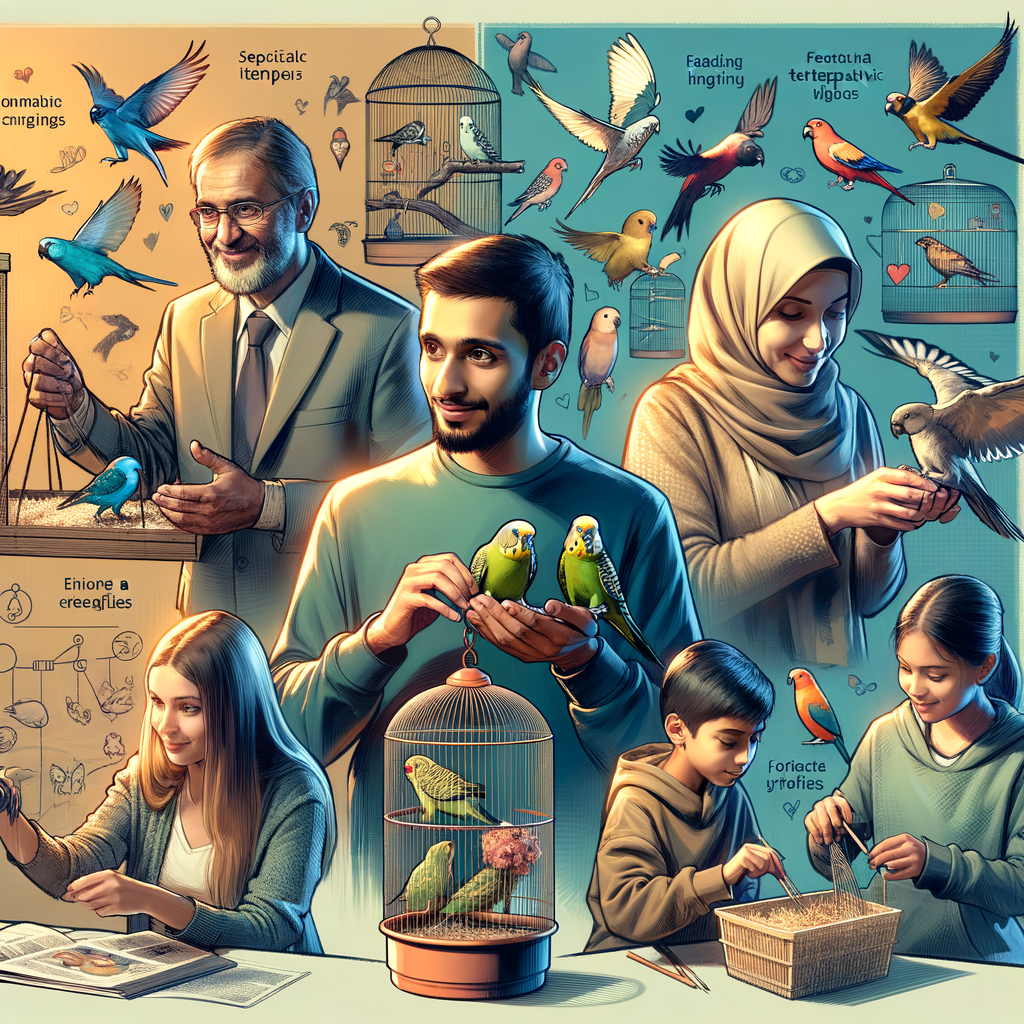
Introduction to the Charm of Pet Birds
There’s a unique charm that pet birds bring into our lives. Their vibrant colors, enchanting songs, and playful behaviors make them a delightful addition to any home. But what exactly makes these feathered friends so captivating? Let’s dive into the world of pet birds and explore their unique appeal.
- Exploring the Unique Appeal of Bird Pets
- Understanding Why Pet Birds Captivate So Many Enthusiasts
One of the most appealing aspects of bird pets is their diversity. With thousands of bird species around the world, each with its own unique characteristics, there’s a bird pet for every personality and lifestyle. Some people are drawn to the melodious songs of canaries, while others are fascinated by the intelligence and talking ability of parrots. Moreover, bird pets are known for their vibrant plumage, which adds a splash of color and life to any space.
Bird pets captivate enthusiasts for a variety of reasons. For one, they offer companionship without the high maintenance needs of other pets. They don’t require walks or large spaces to roam, making them ideal for apartment dwellers or those with busy lifestyles. Additionally, bird pets are known for their long lifespans, meaning they can be a companion for many years. Lastly, bird pets offer a unique opportunity to learn about nature and wildlife, sparking curiosity and fostering a love for the environment.
In conclusion, the charm of pet birds lies in their diversity, low maintenance needs, long lifespans, and the unique learning opportunities they offer. Whether you’re a bird enthusiast or considering getting a bird pet, understanding these aspects can help you appreciate these feathered friends even more.
Understanding Pet Birds: A Closer Look at Their Behavior
One of the most fascinating aspects of owning a pet bird is understanding their behavior. Birds are intelligent creatures, each with their unique way of communicating and expressing themselves. Let’s delve into the world of bird behavior and learn how to decode their actions.
Decoding Pet Bird Behavior
Understanding your pet bird’s behavior is crucial to building a strong bond with them. It can also help you identify any potential health issues early on. Here, we’ll explore two key aspects of bird behavior: communication and common behaviors.
- Understanding bird communication: vocalizations and body language
- Common behaviors and what they mean
Birds communicate in two primary ways: through sounds (vocalizations) and body language. Vocalizations can include songs, calls, and other noises. These sounds can indicate various things, such as happiness, stress, or a need for attention. Body language, on the other hand, can provide insight into a bird’s mood and comfort level. For example, a relaxed bird may fluff its feathers, while a stressed bird may hold its feathers close to its body.
Common bird behaviors can vary greatly depending on the species. However, some behaviors are universal. Preening, for example, is a behavior where birds clean their feathers with their beak. This is a sign of a healthy and content bird. On the other hand, if your bird is plucking its feathers, it could be a sign of stress or illness. Other common behaviors include perching, singing, and foraging. Understanding these behaviors can help you ensure your bird is happy and healthy.
Decoding bird behavior can be a rewarding experience. It allows you to understand your pet on a deeper level and provide them with the best care possible. Remember, every bird is unique, so it’s important to spend time observing your pet to understand their individual behaviors and needs.
Case Study: Parrot Intelligence
Parrots, known for their vibrant colors and charming personalities, are also recognized for their remarkable intelligence. Let’s delve into this fascinating aspect of their behavior.
- Overview of Parrot Intelligence
Parrots are among the most intelligent bird species. They possess cognitive abilities that rival those of primates and even human toddlers. Studies have shown that parrots have the ability to understand complex concepts such as shape, color, and quantity. They can also recognize themselves in a mirror – a trait that is considered a sign of self-awareness and advanced intelligence.
Parrots are also known for their exceptional memory. They can remember and mimic human speech, which is a clear indication of their ability to learn and recall. They can even associate words with their meanings, demonstrating a level of comprehension beyond mere repetition.
- Examples of Problem-Solving Abilities in Parrots
Parrots’ intelligence is not just limited to their ability to mimic human speech. They have also demonstrated impressive problem-solving skills. Here are some examples:
| Example | Description |
|---|---|
| Use of Tools | Parrots have been observed using tools to obtain food, a behavior that requires both problem-solving skills and physical dexterity. For instance, they can use a stick to reach food that is out of their reach. |
| Opening Complex Locks | Some parrots can figure out how to open complex locks to escape from their cages. This requires understanding the mechanism of the lock and the sequence of steps needed to open it. |
| Solving Puzzles | Parrots can solve puzzles that involve arranging shapes in a certain order or finding a hidden object, demonstrating their ability to understand and manipulate their environment. |
In conclusion, parrots are not just beautiful and entertaining pets. They are also intelligent creatures capable of complex thought and problem-solving. Their intelligence is a testament to the diversity and richness of bird behavior.
Essentials of Bird Keeping: Pet Bird Care
One of the most important aspects of bird keeping is ensuring your pet bird receives proper care. This includes understanding their dietary needs and making sure they are fed the right food.
Nutrition and Feeding
Just like humans, birds need a balanced diet to stay healthy. Let’s delve into the details of pet bird nutrition and feeding.
- Understanding the dietary needs of pet birds
- Choosing the right food for your bird pet
Every bird species has unique dietary needs. For instance, parrots and budgies thrive on a diet rich in fruits, vegetables, and grains. On the other hand, canaries and finches require a diet high in seeds. It’s crucial to research your bird’s species to understand their specific dietary requirements.
Once you understand your bird’s dietary needs, the next step is choosing the right food. Commercial bird food often provides a balanced diet, but it’s also important to supplement this with fresh fruits and vegetables. Avoid feeding your bird avocado, chocolate, and caffeine as these can be toxic to them. Always consult with your vet before introducing new foods to your bird’s diet.
In conclusion, proper nutrition is key to your bird’s health and longevity. By understanding their dietary needs and choosing the right food, you can ensure your feathered friend stays happy and healthy.
Health and Wellness
Keeping your pet bird healthy and well is a vital part of bird ownership. This involves understanding common health issues that can affect pet birds and the importance of regular vet check-ups.
- Common health issues in pet birds
Just like any other pet, birds can also suffer from various health issues. Some of the most common health problems in pet birds include:
| Health Issue | Description |
|---|---|
| Feather Plucking | This is a common issue where birds pluck their own feathers due to stress, boredom, or medical issues. |
| Respiratory Problems | Birds can suffer from respiratory issues due to poor air quality, infections, or allergies. |
| Parasites | Parasites such as mites and lice can infest your bird, causing discomfort and health problems. |
It’s important to be aware of these issues and monitor your bird for any signs of illness. Early detection can make a significant difference in treatment and recovery.
- Importance of regular vet check-ups
Regular vet check-ups are crucial to ensure your bird’s health and wellness. These check-ups allow the vet to monitor your bird’s health and detect any potential issues early. During a check-up, the vet may:
- Perform a physical examination to check for any signs of illness or injury.
- Conduct tests to screen for common diseases and parasites.
- Provide vaccinations to protect against certain diseases.
- Offer advice on diet, exercise, and care to help keep your bird healthy.
Remember, prevention is always better than cure. Regular vet visits can help keep your pet bird healthy and happy for years to come.
Benefits of Pet Birds: Why Bird Ownership is Rewarding
Having a pet bird can be a rewarding experience that goes beyond just having a beautiful creature to admire. There are numerous benefits to bird ownership that can enhance your lifestyle and wellbeing. Let’s explore some of these benefits.
-
The Therapeutic Effects of Bird Pets
One of the most significant benefits of owning a pet bird is the therapeutic effect it can have on your mental health. The soothing sounds of a bird’s song can help reduce stress and anxiety. According to a study, interacting with birds can significantly improve mood and provide emotional comfort.
Moreover, the responsibility of caring for a bird can provide a sense of purpose and routine, which can be beneficial for those struggling with feelings of loneliness or depression. The act of feeding, cleaning, and interacting with your bird can provide a positive distraction from negative thoughts.
-
How Pet Birds Can Enhance Your Lifestyle
Pet birds can also enhance your lifestyle in many ways. For starters, they can be a great source of entertainment. Birds are known for their playful nature and unique personalities, which can bring joy and laughter into your home.
Additionally, birds are relatively low-maintenance compared to other pets. They don’t require daily walks like dogs, and they’re comfortable in smaller spaces, making them ideal for apartment living. Plus, their long lifespan means you’ll have a companion for many years to come.
Finally, owning a bird can also provide educational benefits. It’s a chance to learn about different bird species, their behaviors, and their habitats. This can be a great way to foster a love of nature and wildlife, especially in children.
In conclusion, owning a pet bird is not just about having a pet; it’s about experiencing a unique bond with a creature that can bring joy, provide therapeutic benefits, and enhance your lifestyle in numerous ways. So, if you’re considering getting a pet, a bird might just be the perfect choice for you.
Exploring the Diversity: Types of Pet Birds
There is a remarkable diversity in the world of pet birds, each with their unique characteristics. Let’s take a closer look at some of the most popular pet bird species and what makes them so special.
Popular Pet Bird Species
Here are some of the most popular bird pets that people around the world love and cherish:
- Overview of the most popular bird pets
- Key characteristics of each species
From small, chirpy canaries to large, majestic macaws, pet birds come in all shapes and sizes. Some of the most popular pet bird species include Budgerigars, Cockatiels, Lovebirds, African Grey Parrots, and Canaries. Each of these birds has its unique charm and personality, making them a joy to have around.
Let’s delve into the key characteristics of these popular bird species:
| Species | Key Characteristics |
|---|---|
| Budgerigars | These small, colorful birds are known for their playful nature and ability to mimic human speech. |
| Cockatiels | Cockatiels are friendly and easy to train, making them a great choice for first-time bird owners. |
| Lovebirds | As their name suggests, Lovebirds are affectionate and enjoy being in pairs. They are small in size but have big personalities. |
| African Grey Parrots | These birds are highly intelligent and are known for their impressive ability to mimic human speech and sounds. |
| Canaries | Canaries are famous for their beautiful song. They are relatively easy to care for and prefer to be housed alone. |
Choosing the right bird for you depends on various factors such as your lifestyle, the bird’s care needs, and your personal preferences. No matter which bird you choose, remember that each bird is a unique individual with its own needs and personality.
Choosing the Right Bird for You
Choosing the right bird for your home involves careful consideration. It’s not just about picking the prettiest bird or the one that sings the sweetest. It’s about finding a bird that fits your lifestyle and meets your expectations as a pet owner. Here are some factors to consider when choosing a pet bird and how to match bird species to your lifestyle.
- Factors to Consider When Choosing a Pet Bird
- Matching Bird Species to Your Lifestyle
When choosing a pet bird, there are several factors to consider. These include the bird’s lifespan, its size, the level of care it requires, and its personality. For example, some birds, like parrots, can live for many decades, while others, like canaries, have shorter lifespans. Larger birds often require more space and care than smaller ones. Some birds are social and enjoy interaction, while others are more independent. Understanding these factors can help you choose a bird that fits your lifestyle and expectations.
| Bird Type | Lifespan | Size | Care Level | Personality |
|---|---|---|---|---|
| Parrot | Up to 80 years | Large | High | Social and interactive |
| Canary | 10-15 years | Small | Medium | Independent, enjoys singing |
Matching a bird species to your lifestyle is crucial for both your happiness and the bird’s well-being. If you’re a busy person who’s often not at home, a more independent bird species might be a better fit. If you have plenty of time to interact with your pet and enjoy social activities, a more social bird species might be a good choice. Remember, a pet bird is a long-term commitment, so it’s essential to choose a bird that fits your lifestyle.
In conclusion, choosing the right bird involves careful consideration of various factors and matching the bird’s needs to your lifestyle. By doing so, you can ensure a happy and fulfilling relationship with your feathered friend.
Conclusion: The Enduring Appeal of Pet Birds
As we draw this discussion to a close, it’s clear that pet birds have an enduring appeal that transcends time and culture. Their vibrant colors, unique behaviors, and the joy they bring into our lives make them an excellent choice for pet enthusiasts. Let’s recap the allure of bird pets and share some final thoughts for potential pet bird enthusiasts.
- Recap of the allure of bird pets:
- Final thoughts for potential pet bird enthusiasts:
From their captivating beauty to their engaging personalities, pet birds have much to offer. They are not just pets; they are companions that bring a sense of calm and happiness. Their diverse species, each with its unique traits, offer a wide range of options for potential bird owners. Whether it’s the intelligence of a parrot, the melodious song of a canary, or the low maintenance of a budgie, there’s a bird for every home.
If you’re considering getting a pet bird, remember that they require care and attention just like any other pet. From providing a suitable habitat to ensuring a balanced diet and regular exercise, bird ownership is a commitment. However, the rewards are immense. The companionship, the joy of watching them fly and play, and the soothing effect of their song make it all worthwhile. As the saying goes, “A bird does not sing because it has an answer. It sings because it has a song.”
In conclusion, the appeal of pet birds is enduring and profound. They bring color, joy, and music into our lives, making our homes more lively and our hearts fuller. If you’re ready for the commitment, a pet bird could be the perfect addition to your family.
